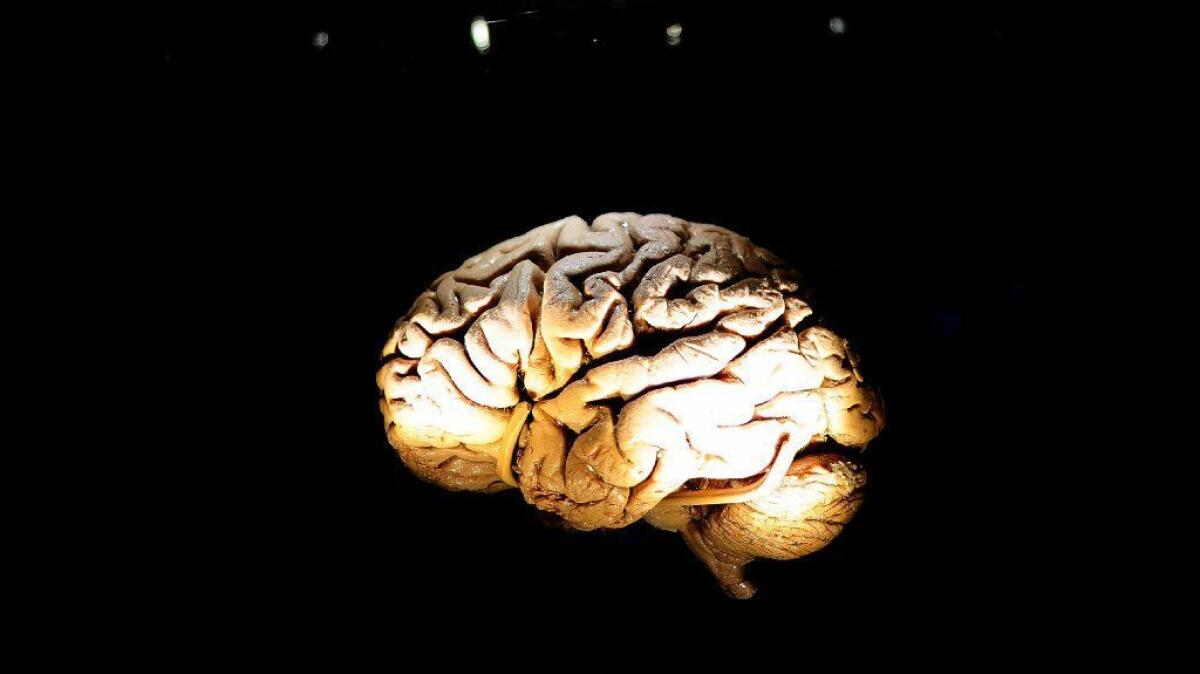Can a hormone called klotho enhance cognition and hold off dementia? Yes, in mice, at least

- Share via
If ever there were a hormone to spark intellectual excitement, it’s klotho.
At the dawn of our lives, our blood brims with klotho. But as age and disease stiffen our joints and cloud our minds, klotho ebbs. People who exercise and remain spry into old age have more of the stuff. Those suffering chronic stress or degenerative brain diseases such Parkinson’s and Alzheimer’s see theirs depleted.
In ancient Greek mythology, Clotho was one of the three Fates — she who spins the thread of life and decides when a mortal being will be born and when he will die. In humans and in mice, the hormone klotho is produced by the kidneys and a clutch of cells that line the brain’s fluid-filled ventricles.
A new study asks, what if this seeming elixir of life could be distilled in a lab, loaded into a syringe and simply injected into the body? Would it make a difference?
The answer — in mice young and old, diseased and well, slow-moving and fleet of paw — is yes, yes it would.
Klotho, the study showed, improved the cognitive performance and even the mobility of mice whose brains were riddled with clumps and tangles of toxic proteins that are hallmarks of dementia and other debilitating brain diseases. It boosted the maze-running and reward-finding skills of mice who merely suffered the normal cognitive depredations of age. And it charged up the mental horsepower of mice in their prime of life.
All these things it did, say researchers, without so much as entering the brain.
“It was amazing — really amazing and remarkable,” said Dr. Dena B. Dubal, a UC San Francisco neurologist and neuroscientist who is the senior author of the study published Tuesday in the journal Cell Reports.
“We were surprised by the results,” she said — and then they carefully conducted the studies again.
The injections (of a klotho fragment similar to what circulates naturally in the bloodstream) not only induced cognitive performance improvements in animals whose brains were riddled with brain disease. The improvements were apparent immediately after klotho injection, and, in elderly mice, were still evident two days later.
Most remarkably, the scale of the behavioral changes observed in the mice that got the klotho injections were on a par with improvements seen in mice who, in previous experiments, had been genetically engineered to produce more klotho over a lifetime. Injections appeared to be powerfully fast-acting medicine.
When it comes to explaining exactly how klotho produced such results, Dubal acknowledges that her team is at a bit of a loss.
She and her colleagues are burning to know whether klotho could be as powerful a cognitive enhancer and protector in humans as it appears to be in mice. Clinical trials of the hormone fragment they used to inject mice “are definitely at the forefront of our thinking,” she said.
But “the more that we can know about the mechanisms” by which klotho strengthens and protects the aging brain, she said, “the better.”
And they are not entirely clueless in this regard, Dubal said. One possible explanation came on closer inspection of the preserved brain tissue of mice who got the klotho treatment. Many hours after normal mice got the klotho injection, researchers could measure increased strength in the electrical signals jumping from cell to cell in the hippocampus — a structure key to learning and memory.
“It suggests klotho is strengthening something fundamental in the brain”: the underlying strength of the brain’s electrical connections, Dubal said.
How those changes are induced by a substance that never enters the brain is a mystery of mind-body signaling that Dubal said she is determined to crack. The team’s mice experiments have given rise to some educated guesses about which chemicals are triggered and where in the brain those signals are heard. Her team will pursue those surmises even as they contemplate clinical trials and partnerships with biotech firms, she said.
“We won’t know whether this is relevant to the human condition until it’s tested in humans,” said Dubal.
ALSO
Will the Great American Eclipse make animals act strangely? Science says yes
Scientists tally the environmental impact of feeding meat to our cats and dogs. It’s huge
How safe is your tuna? It’s important to know where it was caught





